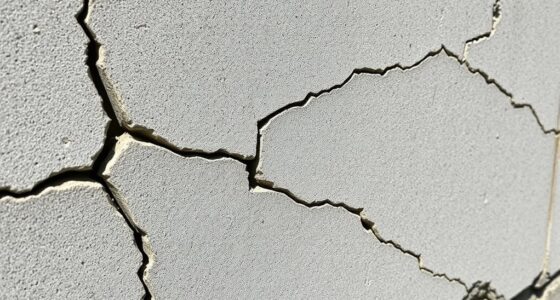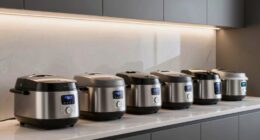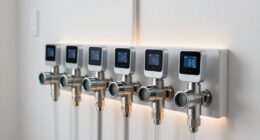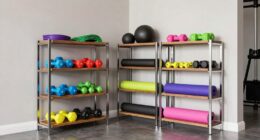HVAC filters play a crucial role in trapping dust, pollen, pet dander, and airborne pollutants to improve your indoor air quality. There are different types, from basic fiberglass filters to high-efficiency HEPA models, each offering varying filtration capacities. It’s important to select a filter compatible with your system and replace it regularly—every 1 to 3 months—to maintain efficiency and prolong your HVAC’s lifespan. Keep going to discover how to choose and change filters properly.
Key Takeaways
- HVAC filters trap airborne particles like dust, pollen, and pet dander, improving indoor air quality.
- Common filter types include fiberglass, pleated, and HEPA filters, with varying filtration efficiencies.
- Higher MERV-rated filters capture smaller particles but may restrict airflow, so compatibility is important.
- Replace filters every 1 to 3 months to maintain efficiency and prevent system strain.
- Always turn off the HVAC system before replacing filters, and ensure correct installation with airflow arrows.

Have you ever wondered how your heating and cooling system keeps your indoor air clean? It all comes down to your HVAC filters. These small but essential components play a big role in air purification, trapping dust, pollen, pet dander, and other airborne particles that can affect your health and comfort. Proper filter maintenance is indispensable to ensure your system runs efficiently and continues to improve indoor air quality. When you neglect to change or clean your filters, they become clogged, reducing airflow and forcing your system to work harder, which can lead to increased energy bills and wear on your equipment.
Regularly replacing HVAC filters keeps your indoor air clean and your system running efficiently.
Understanding the importance of air purification through your HVAC filters helps you realize why regular replacement is necessary. Filters act as the first line of defense against airborne contaminants, preventing them from circulating throughout your home. The more effectively your filter captures particles, the cleaner your indoor air remains. However, filters don’t last forever. Over time, they become saturated with debris and lose their ability to filter effectively, making filter maintenance an essential part of your home care routine. Additionally, choosing a filter with the appropriate contrast ratio can help improve the visibility of the filtered air, ensuring optimal performance.
Choosing the right filter for your needs is just as important as replacing it on schedule. There are various types of filters, from basic fiberglass filters to high-efficiency pleated filters and even specialized HEPA filters. Each type offers different levels of air purification. For most homes, a simple pleated filter with a MERV rating of 8 to 13 strikes a good balance between cost and filtration efficiency. Higher-rated filters trap smaller particles but can also restrict airflow if your system isn’t designed for them, so it’s essential to select a filter compatible with your HVAC system.
Changing your filter regularly is straightforward but often overlooked. Most manufacturers recommend replacing filters every 1 to 3 months, depending on factors like household size, pets, and air quality. During filter maintenance, always turn off your system, remove the old filter carefully, and install the new one correctly, ensuring the airflow arrows point in the right direction. This simple task can substantially improve air purification, reduce strain on your system, and prolong its lifespan.
Frequently Asked Questions
How Often Should I Upgrade My HVAC Filter?
You should upgrade your HVAC filter every 1 to 3 months, depending on your filter’s lifespan and your home’s needs. Check the filter regularly—if it looks dirty or clogged, replace it sooner. A good replacement schedule helps maintain air quality and system efficiency. Factors like pets, allergies, or high usage may require more frequent changes, so stay attentive to your filter’s condition for ideal performance.
Can I Use a Higher MERV Rating Filter in My System?
You can try using a higher MERV rating filter, but beware—your system might struggle or get damaged. Not all filters are compatible with your HVAC system, so check the manufacturer’s guidelines first. Higher MERV ratings trap more particles, but they can restrict airflow if your system isn’t designed for them. Always prioritize filter compatibility and consult your HVAC manual to avoid turning your system into a clogged nightmare.
Are There Eco-Friendly HVAC Filter Options Available?
Yes, eco-friendly options like biodegradable filters are available for your HVAC system. These filters are made from sustainable materials that break down naturally, reducing environmental impact. You can find biodegradable filters designed to maintain air quality while being environmentally conscious. Switching to these options helps you support sustainability without sacrificing filter performance. Just guarantee the biodegradable filter you choose fits your system’s specifications for peak efficiency and air filtration.
How Do I Dispose of Used HVAC Filters Properly?
Ever wonder if you’re disposing of your HVAC filters responsibly? You should, because proper filter disposal is important. You can usually recycle filters through local recycling programs or special collection events. Check if your area offers recycling options for used filters, or consider disposing of them at designated waste facilities. Always follow manufacturer instructions and local regulations to guarantee environmentally friendly filter disposal and reduce waste.
Do Smart Filters Exist That Monitor Air Quality?
Yes, smart filters with built-in smart sensors do exist to monitor air quality. These advanced filters track pollutants, humidity, and other air quality indicators, providing real-time data through connected apps. You can easily stay informed about your indoor environment and know when to replace the filter. Smart filters improve air quality management by giving you actionable insights, making your home healthier and more comfortable.
Conclusion
Just like the trusty shield in a hero’s arsenal, choosing the right HVAC filter protects your home from dust, allergens, and pollutants. Regular replacements keep your system running smoothly, much like a well-tuned engine. Remember, a clean filter is your first line of defense—think of it as your personal Gandalf, warding off the dark forces of dirt and debris. Keep it fresh, and breathe easy knowing your home’s air quality is always at its best.









